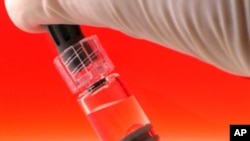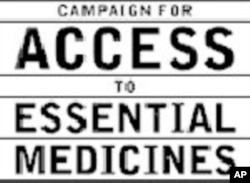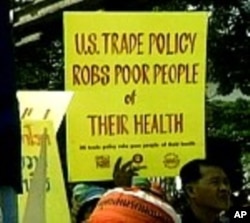A government hearing on U.S. trade policy has produced more than 700 recommendations to help developing countries purchase affordable, life-sustaining medicines to fight AIDS and other afflictions.
Testifying in Washington this month, the organization Doctors without Borders (MSF, or Medcins Sans Frontieres) joined other groups in asking the U.S. trade representative to make it easier for poor countries to obtain generic drugs without being penalized for circumventing robust intellectual property rights protections secured by western drug companies.
MSF treats neglected tropical diseases and more than 140,000 HIV/AIDS patients in more than 30 developing countries. Emi MacLean, who directs the group’s Access to Essential Medicines Campaign, says she alerted the panel that U.S. trade policies and intellectual property protections are having a detrimental effect on international efforts to expand access to affordable pharmaceuticals.
“It’s essentially the U.S. government attempting to strong-arm countries through our trade policies in a way that has a seriously detrimental effect on access to medicines around the world,” she says.
This month’s first-ever public hearing on Section 301 provisions of the U.S. Trade Act stem from a commitment by the Obama administration to greater transparency in formulating U.S. trade policy. MacLean says that in past years, the closed hearings generated annual reports that favored the drug companies and enabled them to impose strong sanctions, which limited the ability of poor countries to provide relief for their vulnerable populations.
“Every year, the U.S. government produces a report of countries that they think are not adequately protecting intellectual property. What the U.S. has done, among other things, is criticize countries that are using completely legal tools to try to ensure access to affordable, generic medicines for their populations,” she noted.
Countries coming under particular scrutiny are emerging industrial powers with generic manufacturing capacity, like India, and Thailand and Brazil. Such states are cultivating the capacity to produce an abundance of affordable generic medicines for countries throughout Africa.
MacLean says the upstarts have certain legal rights to limit patents and maximize access to less costly medicines, but that unless evolving U.S. trade provisions find a way to encourage innovation and accommodate the new avenues of distribution, American global health goals are headed on a collision course.
“The cost of HIV/AIDS drugs at the time when we started providing treatment was $10,000 per person, per year. With access to generic medicines, many from India, the cost has plummeted to under $80 per person, per year. And that’s something that because of some of the changes in international intellectual property law over the last decade will not be possible in the future unless countries use the tools within their toolbox to ensure that they have access to generic drugs,” she said.
As commercial drug manufacturers push for U.S. help to extend their patents, they employ strategies that permit them to renew patents and other tools to allow their monopoly to expand. Developing countries deploy other tools to obtain cheaper drugs by overriding a patent, a tactic which MacLean says they are permitted to do with a compulsory license. Another poor country tactic consists of importing drugs from other countries where they are sold for a cheaper price.
Administrations from Clinton to Bush to Obama have admirably led global efforts to raise the flow of medicines to stop the spread of AIDS in sub-Saharan Africa through PEPFAR, the President’s Emergency Program for AIDS Relief and the Global Fund. However, MSF’s Emi MacLean maintains that unless Washington makes sure that research and development is needs-driven and geared to encourage innovation and access to everyone, U.S. trade policy will increasingly undermine U.S. global health policy.
“The United States government with regards to AIDS drugs and with regard to PEPFAR has highlighted the importance of affordable generic drugs in maintaining AIDS programs that the U.S. government operates, making sure that the money that is available goes further. And yet, at the same time, there are a lot of mechanisms in the U.S. I.T. (international trade) policy that are actually having a counterproductive effect,” said MacLean.
She welcomes the escalated response from concerned humanitarian groups and individuals. This year’s report by the U.S. Trade Representative’s office on Section 301 trade policies is due to be released in April.













